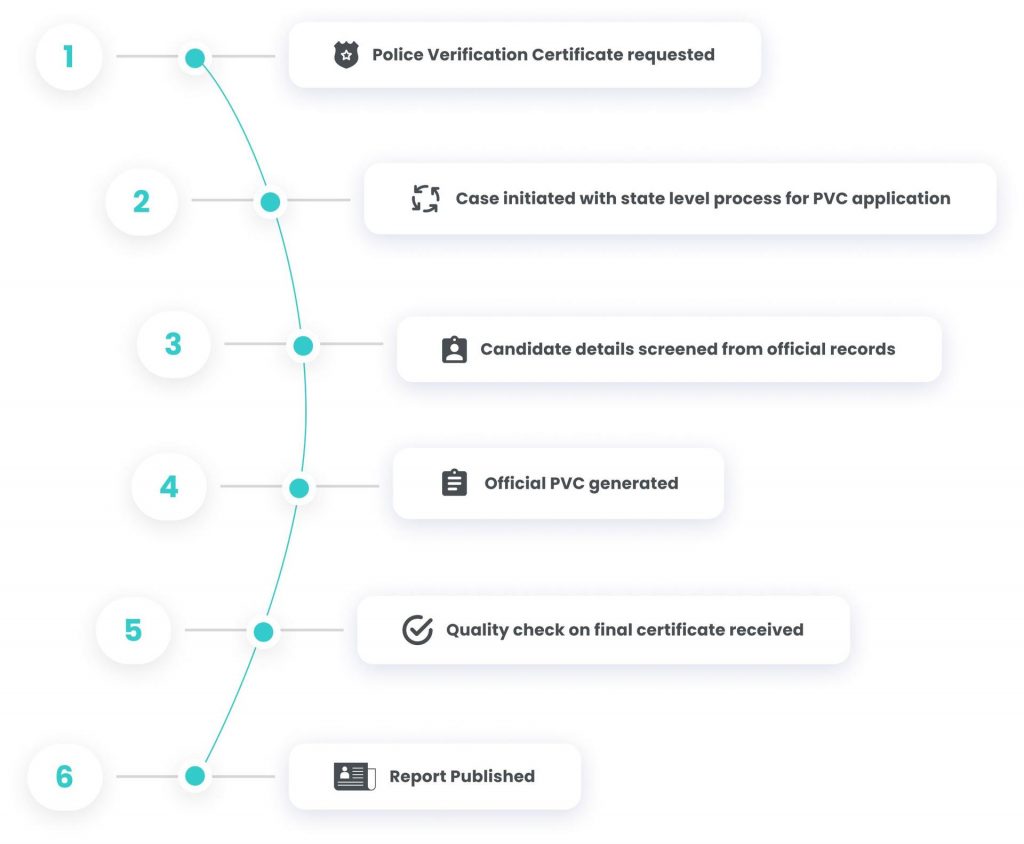Table of Contents
ToggleGetting the right people on board has always been key to an organization’s success — but in 2025, it’s not only about experience and skills. It’s about trustworthiness, integrity, and safety. For this reason, businesses of all sectors are now more commonly requesting job applicants to provide a Police Verification Certificate (PVC) or Police Clearance Certificate (PCC) as part of their regular hiring process.
This article delves in detail into the significance of a police verification certificate for employment positions, how and why employers need it, and how technology solutions such as OnGrid have made the one-time tedious process one that is efficient, consent-based, and convenient.
Also read : A Comprehensive Guide to Police Verification in India
What Is a Police Verification Certificate?
A Police Verification Certificate (PVC), or Police Clearance Certificate (PCC), is a certified document obtained from the state police departments. It certifies that a person has no criminal record entered in his/her name or is not under investigation for any criminal case.
For organizations, this certificate is third-party confirmation of a candidate’s character and fitness for jobs that come with safety, financial prudence, or dealing with the public.
Why Is a Police Clearance Certificate Necessary for Employment?
The office has changed — and so have the dangers. Employers no longer consider background checks a formality; they’re a risk reduction method. Here’s the reason why a police verification certificate has become obligatory in the current employment landscape:
1. Workplace Safety Improvement
Providing a safe and secure workplace is a top concern. Placing an employee with a record of violence, fraud, or misconduct can compromise the health of workers and the physical and intellectual property of the business. A PVC is a preventive measure against insider threats.
2. Compliance to Regulations
In some industries like banking, insurance, logistics, education, health care, and government-linked services, police verification is required by regulators. It keeps employers in sync with workforce screening laws.
3. Safeguarding Reputation and Brand Credibility
With social media and instant information dissemination, a single hiring negligence can have serious repercussions on a company’s reputation. Carrying out police verification indicates that a company is serious about due diligence.
4. Generating Client Confidence
B2B customers and end-users usually require high levels of employee screening, particularly in sectors such as security services, fintech, or customer service. Demonstrating that employees have been police-verified enhances stakeholder trust.
5. Preventing Potential Fraud and Misconduct
The fact that a background check — police verification as well — will be conducted alone tends to discourage wrongdoers from even applying. It induces a culture of accountability and integrity.
Who is Required to Get a Police Verification Certificate for Employment?
Although it is becoming the norm in all types of jobs, police verification is especially important for:
Delivery executives and gig workers (food delivery, e-commerce)
Cab drivers and logistics personnel
Security personnel and facility maintenance staff
Teachers and school officials
Banking and finance industry professionals
Healthcare professionals and caregivers
Customer-facing or field staff
Construction and site staff on sensitive projects
Government contract staff
In effect, any job that involves contact with the public, access to buildings, or sensitive information requires police verification as a security measure.
Problems with Conventional Police Verification Process
Traditionally, getting a police verification certificate was a time-consuming and paper-laden process:
Manual submissions to police stations
Long waiting periods
Poor candidate experience
Lack of centralized tracking
Inconsistent state-wise formatsThis created friction for both employers and job seekers, delaying hiring cycles and frustrating HR teams
OnGrid’s Solution: Digitising Police Verification for Jobs
Identifying these issues, OnGrid provides a paperless, digital-first, and consent-based Police Clearance Certificate solution. Used by more than 3,000 organizations, OnGrid automates the police verification process end-to-end, accelerating faster onboarding, improved compliance, and better candidate experience.
Police Clearance Certificate Process Map (OnGrid)

STEP 1 : Police verification certificate requested
STEP 2: Case initiated with state level process for PVC application
STEP 3: Candidate details screened from official record
STEP 4: Official PVC generated
STEP 5 : Quality check on final certificate received
STEP 6 : Report Published
Key Features of OnGrid’s Police Clearance Certificate Solution
Here’s why organizations across sectors choose OnGrid for their police verification needs:
Expedited Processing
Obtain police clearance certificates swiftly, ensuring quick turnaround times for your hiring process.
User-Friendly Platform
Navigate the police clearance process seamlessly through our intuitive platform, streamlining verification procedures.
Comprehensive Screening
Access thorough background checks with our extensive database network, providing detailed insights into candidates’ criminal history.
Security and Compliance
Trust in OnGrid’s robust security measures to safeguard sensitive data and rely on our compliance expertise to ensure adherence to regulatory standards.
Benefits for Employers
Paperless Submission – No physical visits or paperwork.
Faster Processing – Get hired quickly without bureaucratic delays.
Transparency – Get notified and stay informed throughout the process
Use Case: Gig Economy & Delivery Platforms
India’s gig economy, with millions of workers delivering food, parcels, or transport services — is one of the biggest adopters of police verification. Ensuring the background of a delivery executive or driver is crucial for:
Customer trust
Brand reputation
Reducing legal liabilities
Preventing theft or misconduct
Final Thoughts
In an era where workplace safety, data privacy, and regulatory compliance take center stage, background verification has become more than a checkbox exercise — it’s a strategic necessity. A police verification certificate for job candidates is no longer a nicety — it’s a necessity.
By integrating with a digital verification solution such as OnGrid, employers can conduct police checks as a part of their hiring processes with ease while maintaining compliance, speed, and candidate satisfaction.
Don’t let manual police verification slow down your hiring or expose your business to unnecessary risk. Modernize your approach and hire with confidence
FAQs
Q1. What is the importance of police verification in employment?
Police verification helps ensure that potential employees do not have a criminal background, reducing risks to workplace safety, reputation, and operational security.
Q2. Which jobs typically require police verification?
Jobs in logistics, delivery services, security, education, healthcare, banking, construction, and government contracts often require police verification.
Q3. How long does it take to receive a Police Verification Certificate?
Traditionally, it can take 2–3 weeks, but with digital platforms like OnGrid, it can be expedited to just a few days.
Q4. Can police verification be done online?
Yes. Modern platforms like OnGrid offer consent-based, fully digital police verification solutions that eliminate physical paperwork and visits.
Q5. What is the difference between PVC and PCC?
Both refer to the same concept — Police Verification Certificate (PVC) or Police Clearance Certificate (PCC) — which certifies that a person has no criminal record.





Leave a Reply